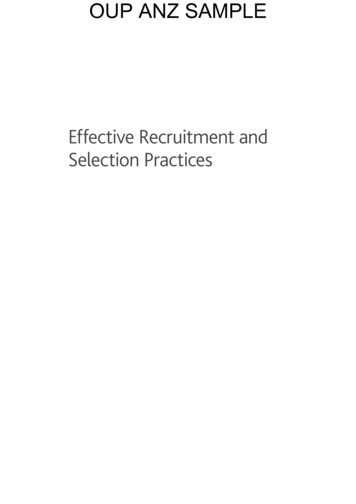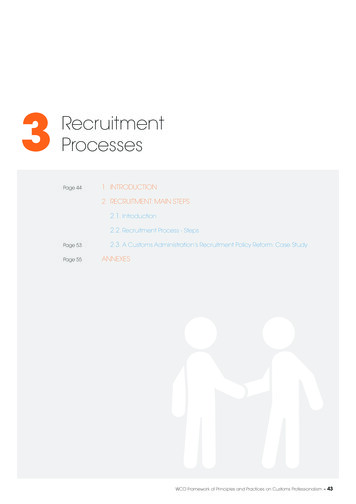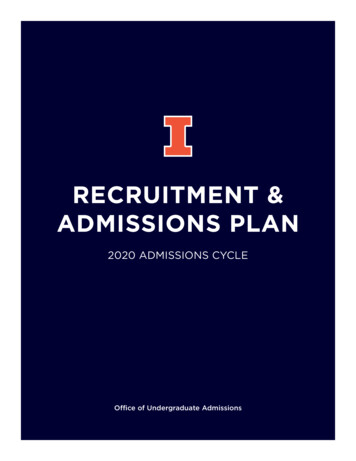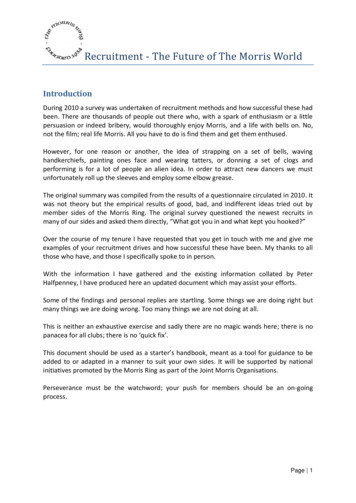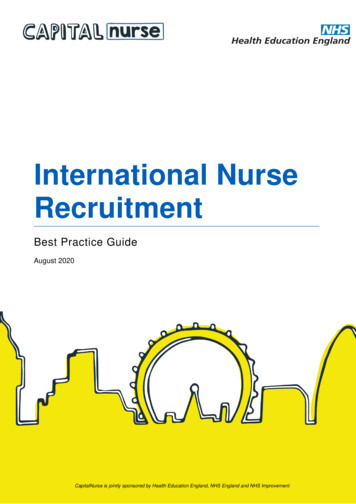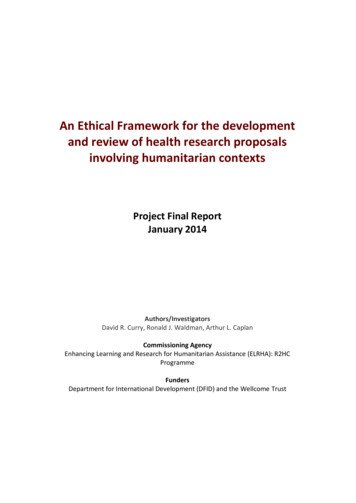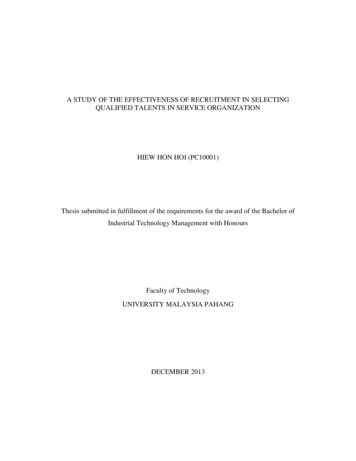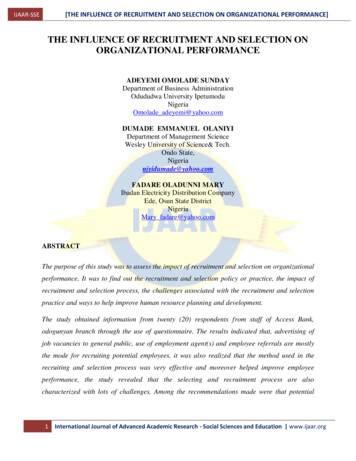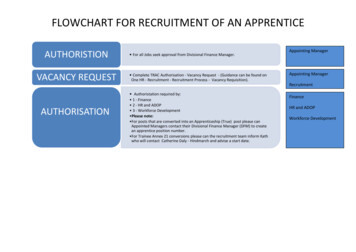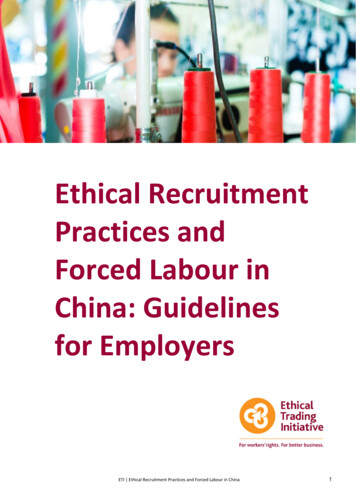
Transcription
Ethical ForcedLabourinandForcedChina: GuidelinesLabour in China:for EmployersGuidelines forEmployersETI Ethical Recruitment Practices and Forced Labour in China1
ContentIntroductionP.3Relevant Legal FrameworkI.II.Global FrameworkChina Legal ContextP.4P.5Guidelines for Preventing Forced Labour:Recruitment, Employment, onP.6P.18P.22Management Systems to Prevent Forced LabourP.23Additional ResourcesP.24ILO Indicators of Forced LabourP.25Appendix I: ETI SurveyP.27Appendix II: Case Studies(written & provided by CCR CSR)P.28ReferencesP.35ETI Ethical Recruitment Practices and Forced Labour in China2
IntroductionAbout ETIFor 20 years, ETI and ourmembers have been a drivingforce in ethical trade. Weinfluence business to actresponsiblyandpromotedecent work.Taking a unique approach tobusiness and human rights, ourmembers are forward-thinkingcompanies, trade unions andNGOs. Together, we tackle thecomplex challenges of today’sglobal supply chains, improvingthe lives of workers worldwide.For more information, visit ourwebsite atwww.ethicaltrade.org.Around the world, an estimated 21 million people are working in forced labour conditions, and many of them are part of global supply chains (ILO 2016).These guidelines are specific to China as one of the most significant supplychain sourcing countries in the world. As more international regulations specific to modern slavery and forced labour are put in place, businesses have agrowing obligation to understand, address and report on forced labour conditions in their supply chains. Awareness of modern slavery risks is also increasing—an ETI survey found that 77% of companies think there is a likelihood of modern slavery in their supply chains, and more companies are takingactions to strengthen their compliance in this area.While these guidelines cover potential forced labour risks throughout the employment process, from recruitment through termination, the in-depth focusis on ethical recruitment practices. Ethical recruitment is essential as thestarting point for preventing forced labour. Workers looking for jobs can bevulnerable to misinformation and intermediaries who may charge fees or control their wages and activities. The use of informal or illegal recruitment channels also heightens the risk of forced labour. While most recent attention onethical recruitment has been focused on international migrant workers, it isalso important to understand ethical recruitment in the context of China’sdomestic workforce, which includes 286 million domestic migrants (NBS2017).These guidelines provide employers operating in China with practical recommendations for addressing forced labour risks in their own businesses. Therecommendations are based on ETI research about local context and currentpractices, including online surveys of workers and human resources personnel regarding their experience with recruitment and employment practices.CCR CSR also provided information and case studies based on their experienceinvestigating and remediating labour rights issues in China.ETI Base Code Clause 1: Employment is freely chosen.1.1 There is no forced, bonded or involuntary prison labour.1.2 Workers are not required to lodge "deposits" or their identity paperswith their employer and are free to leave their employer after reasonable notice.ETI has conducted a series of training in major countries where the supplychains are located, to disseminate information about relevant laws and standards, as well as introduce best practices to help suppliers prevent and eliminate modern slavery in the workplace. In response to possible risks emergingfrom labour supply chain, though outside the workplace, ETI recently partnered with MicroBenefits to launch a “Responsible Recruitment Survey” forfactories and workers respectively. The survey aimed to: Understand current recruitment practices in Chinese factories Identify challenges and risks in the recruitment/job-seeking processETI Ethical Recruitment Practices and Forced Labour in China3
Use survey data to inform the development of training materials on responsible recruitmentThe questionnaire comprises questions about recruitment channels, riskmanagement, pre-entry info-sharing & orientation or training, recruitmentfees, child labour/juvenile workers, grievance, foreign workers and termination and freedom to leave.The survey was deployed through multiple remote channels and respondedby more than 4,000 workers and 200 recruitment/HR Managers from 20 labour intensive manufacturing sectors.Relevant Legal FrameworkI.Global FrameworkThe ILO’s definition of forced labour is any work undertaken involuntarily under threat of a menace of penalty.The two aspects of the definition are:UK Modern(2015)SlaveryActBusinesses are required toreport on the steps they aretaking to address modernslavery.(1)Some workers are employed through deception, coercion, or intimidation, orare forced to work in a particular job to pay off excessive debts owed to theemployer or an intermediary.(2)Modern slavery includes:- Forced labour- Servitude- Human traffickingWhether the work is voluntaryWhether there is a potential penaltyExamples include financial penalties such as the loss of wages or deposits,confiscation of identity papers or travel documents, physical violence or punishment, and removal of rights or privileges. Migrant workers are often particularly at risk of ‘debt bondage’ where they are forced to work to pay offdebts incurred through fees collected in the recruitment process.The ILO Indicators of Forced Labour identify common indicators that forcedlabour may be occurring. These include:1.2.3.4.5.6.7.8.9.10.11.Restricted mobility of workersIsolation of workersAbuse of workers’ vulnerabilitiesDeception of workersPhysical or sexual violence against workersIntimidation and threats against workersRetention of workers’ identity documentsWithholding wagesDebt bondageAbusive living and working conditionsExcessive overtime workingETI Ethical Recruitment Practices and Forced Labour in China4
Additional international laws regulate modern slavery, of which forced labouris one type along with servitude and human trafficking. The UK Modern Slavery Act (2015) requires commercial organizations to report publicly on thesteps they are taking to address modern slavery risks, including those risksoccurred and actions taken in their overseas supply chains. Similar legislationrequiring businesses to report on modern slavery now exists in France andAustralia (ETI 2018), and other G20 countries have legislation in place specifically related to forced labour in supply chains (Global Slavery Index 2018). 1II.China Legal ContextChina has laws and regulations against forced labour. The Penal Law prohibits“forcing another person to work by violence, threat or restriction of personalfreedom” (Article 244, 2011 amendment). In addition, the Labour ContractLaw (2007) has the following detailed provisions:Article 3Labour contracts shall be concluded in adherence to the principles of lawfulness, fairness, equality, voluntariness, consensus through consultation and good faith.Article 9Employers are prohibited from detaining identity cards orcollecting recruitment fees or deposits.Article 26A labour contract shall be invalid if it is concluded or modifiedagainst a party’s true intention by means of deception or coercion, or when the party is in a precarious situation.Article 38A worker may have the labour contract revoked if the employer is found to be failing to pay labour remuneration ontime and in full.Article 38If an employer forces a person to work by resorting to violence, intimidation, or illegal restriction of personal freedom,the worker may revoke the contract without notice.Article 60The labour dispatching unit and the receiving unit may notcharge any fees to dispatched workers.Article 88Administrative and criminal penalties are in place for forcinga person to work by resorting to violence, intimidation or illegal restriction of personal freedom.The use of agencies and intermediaries is also regulated. The Labour ContractLaw regulates the use of employees provided by dispatch agencies, and theInterim Regulations on Labour Dispatch (2014) limit the percentage of dispatched workers in a company to 10%. The Regulations also restrict positionsallowed for dispatched staff to 3 categories: temporary, auxiliary and replacement. Temporary staff can work for a term of no more than 6 months at onecompany.ETI Ethical Recruitment Practices and Forced Labour in China5
The Law on Promotion of Employment (2008) regulates employment services, including labour agents and intermediaries. Under this law, a job intermediary must be registered and meet certain conditions, and may not providefalse employment information, take away a worker’s resident identity card,or take a deposit from the worker.Guidelines for Preventing Forced Labour: Recruitment,Employment, TerminationI.RecruitmentConducting the recruitment process in a transparent and ethical manner creates a strong foundation for protection of worker rights and mitigating risksof forced labour. Recruitment is a top business priority for the manufacturingsector in China, which relies on large workforces and where turnover can beas high as 15% per month (ETI interviews).The continuous hiring of new workers for regular production and to meet increased workforce needs during peak production seasons makes it even moreimportant for employers to thoroughly assess and monitor recruitment practices.Many manufacturers in China recruit workers directly, but third-party labourbrokers and agents are active as well, particularly for hiring of dispatch workers and short-term workers. This guidance covers direct recruitment by theemployer and indirect recruitment using third parties.Principles for the Recruitment Process(1)No Recruitment FeesAs a principle, workers should not pay any fees as part of the recruitmentprocess, to employers or agents.12% of workers report thatthey have paid money to obtaina job------------------------29% of workers paid fortheir health examination,mainly in the footwear andelectronics industriesMany brands and industry associations have made a commitment to no recruitment fees, including the Responsible Business Alliance, American Apparel & Footwear Association and the Fair Labour Association.1Recruitment fees can contribute to forced labour especially when they are sohigh that the worker has incurred significant debt (whether to the employeror an intermediary) and is unable to leave his or her job until the debt is paid.International migrants are most at risk from high recruitment fees and potential debt bondage.The ILO defines recruitment fees and related costs as: “all fees, charges, expenses or financial obligations incurred in the recruitment process in order for1Detailed information about recruitment fee definitions and terms by the Alliance to End Slavery and Trafficking, Institute for Human Rights and Business, Open Working Group on Labour Migration & Recruitment, Responsible Business Alliance, UN Global Compact/Verité, Association of Labour Providers, International Organization for Migration, KNOMAD/ILO, ITUC, World Employment Confederation, and Consumer Goods Forum are available here via ILO research.ETI Ethical Recruitment Practices and Forced Labour in China6
workers to secure employment, regardless of the manner, timing or locationof their imposition or collection.”These include:-Payments for recruitment services offered by labour recruitersPayments made by workers during direct hire by employersCosts for obligatory medical testsCosts for skills and qualifications tests and trainingCosts for travelCosts for introduction and orientation programmesOther administrative costsFor the case of international migration, recruitment fees and costs also include fees for international travel and transportation, clearances and permits,and pre-departure orientation.ILO Principle:Workers shall not be charged directly or indirectly, in whole or in part, anyfees or costs for their recruitment.RBA Principle:Workers shall not be required to pay fees for their employment.AAFA/FLA Commitment:We commit to work with our global supply chain partners to create conditions so that no workers pay for their job.US Government:Government solicitations and contracts shall prohibit contractors, contractor employees, subcontractors, subcontractor employees, and their agentsfrom charging employees or potential employees recruitment fees. As ofJanuary 2019, recruitment fees are officially defined as: “fees of any type,including charges, costs, assessments, or other financial obligations, thatare associated with the recruiting process, regardless of the time, manner,or location of imposition or collection of the fee."In China’s current labour market, workers are in high demand, and thereforeare less likely to be charged recruitment fees. However, in the ETI survey, 12%of workers reported that they had paid money to obtain a job at some point,whether to a labour dispatch agency, an intermediary, or to the employer directly. Also, 29% of workers (mostly in the footwear and electronics industries) reported paying for their health examination.China regulations mandate that workers cannot be charged recruitment fees,but does not specify regarding the fees for normal medical checks, which aresometimes paid for by workers in China. Research in 2017 found that a factoryin Shaoguan required workers to undergo two rounds of physical examinationand pay the medical fees themselves.Employers should be responsible for covering the medical check costs duringrecruitment period in the following two situations:ETI Ethical Recruitment Practices and Forced Labour in China7
Occupational health checks: Per Law of the People's Republic of China onthe Prevention and Control of Occupational Disease Article 35, employershould pay for occupational health checks for the employee. Juvenile workers’ health check: Per Juvenile Workers Special ProtectionRegulations Article 10,employer should pay for juvenile workers’ bodycheck during recruitment.Actions to Reduce Risks60% of workers have foundjobs through relationshipnetworks------------------------89% of factories recruitworkers through internalreferrals Do you have a policy that you do not charge any recruitment fees toworkers, including for mandatory health exams? Do you have a policy on how to respond if recruitment fees are foundto have been paid, whether to your staff or to an agent? Are your HR personnel and any other staff involved in recruitmenttrained on this policy and how to implement it? Do you ask job applicants how they found out about the position, andwhether they have paid any fees to intermediaries or agents? Do you interview new workers after 3-6 months to ask whether theypaid any recruitment fees or have any debt from the recruitment process?(2)Transparency of Job InformationProviding clear and accurate information during the recruitment processhelps to ensure that potential workers are fully informed and voluntarily participating in employment. Job advertisements and other information sharedat job fairs, job centres, on online platforms, and by all intermediaries shouldclearly state all relevant information about working conditions, contractterms, wages and earnings, and those terms should be consistent from jobapplication through contract signing and employment.In China, 60% of workers in our survey said they have found jobs through theirrelationship networks, and 89% of HR professionals surveyed said that theyrecruit workers through internal referrals. In order to confirm that the applicant’s information about the job is accurate, the hiring interview should include questions to confirm key aspects of the job being offered.When recruitment information is not accurately transferred to workers, thereis a higher risk of having workers who are not satisfied with the working andemployment conditions, workers who claim to be deceived and exploited.ETI Ethical Recruitment Practices and Forced Labour in China8
Actions to Reduce Risks Do you always include detailed and transparent information in your jobadvertisements that are posted physically or online, or shared with intermediaries? Do you monitor any agents or intermediaries to understand whethertheir descriptions of your jobs are comprehensive and accurate? Do you ask applicants what their understanding of the job terms andconditions are, to ensure that any misinformation or misconceptionsare resolved during the hiring process?(3)Contracts are Clearly Understood and Signed VoluntarilyWorkers must be provided with a written contract of employment which theyunderstand and voluntarily sign prior to employment. There must be no contract substitution or use of supplemental agreements with less favourableprovisions. The contract should include the following content:41%, 20% and 24%of workers from electronics,garment and footwearrespectively have been givenfalse information duringrecruitmentBasic Information Nature of work and address where it will be performed Contract start and end datesWorking Hours Including voluntary overtime, maximum allowable overtime hours, frequency of rest days and holidaysFinancial Information Wages: Regular, overtime and holiday wage rates Deductions: Estimates of amount and line item descriptions of each anticipated deduction Any fees or deposits that might occur during the recruitment and employment period Payment practices: Frequency, methods and format of pay slips Minimum and maximum net pay the worker can expect to receive eachmonthTermination Process and Terms Provisions for voluntary early termination of contract by worker withand without reasonable noticeBenefits and Accommodation Benefits: Description of work-related benefits including medical andsocial insurance and sick, emergency and annual leave Accommodation and living conditions where relevant, e.g. if adormitory is provided by the employerEvery new hire must receive an in-depth explanation of the nature and termsof employment prior to signing the employment contract. The orientationETI Ethical Recruitment Practices and Forced Labour in China9
should include supplier policies regarding forced labour, recruitment fees andexpenses, document retention and safekeeping, freedom of movement, harassment and discipline, grievance procedures, and terms and conditions ofemployment. This reduces the potential for workers to inadvertently agree toterms of employment they are not willing to accept, and mitigates the risk offorced labour by informing workers of their rights, the supporting policies andprotections which are in place, and mechanisms for accountability and enforcement.Actions to Reduce Risks Do you have personnel who can communicate with new workers intheir own language or dialect? Do you allow time before the contract signing to carefully read throughthe contract details together? Do you allow sufficient time for workers to ask questions about the contract before signing? Do you have policies in place regarding: forced labour, recruitment feesand expenses, document retention and safekeeping, freedom of movement, harassment and discipline, grievance procedures, and terms andconditions of employment? Are these policies provided to the workers, physically posted, or otherwise readily available for workers to access? Do you have any way to check whether workers understand these policies?Recruitment and Employment Mechanisms in ChinaETI’s research identified different types of recruitment and employmentmechanisms, which often vary by different types of workers as defined byChinese law. The following are the typical recruitment and employment typesin the manufacturing sector.Full-Time Permanent Workers may be recruited directly by the factory orthrough a recruitment agent. They have an employment contract with thefactory and are paid directly.Labour Dispatch Workers are employed by a labour dispatch company, notdirectly by the factory. Regulations allow dispatch workers to hold temporary,auxiliary and substitute jobs in one factory for up to 6 months, and the number of dispatch workers is limited to 10% of the workforce.Short-Term Workers are recruited directly by the factory or by another intermediary, and although required by law, in practice they often do not have aformal employment contract. An agent may manage and pay the workers, orthe factory may manage and pay the workers directly. Short-term workers arecommonly used to meet seasonal or short-term demand for increased proETI Ethical Recruitment Practices and Forced Labour in China10
duction. They are typically found through local relationships, local labour markets, or through a local labour ‘boss’ or ‘headman’ who organizes a team. Factories may hire short-term workers through informal channels to reduce theiradministrative burden and costs such as social insurance. Workers may prefershort-term informal employment when it offers higher wages.Student Interns are placed in the factory through an agreement between avocational school and a factory. They are subject to specific wage and OHSregulations.International Migrant Workers are either hired through official arrangements (such as with the North Korean government) or are typically workingillegally and/or informally, without official visas or authentic identity documents.Recruitment Risk Areas(1)Agents and IntermediariesUse of intermediaries and third parties for recruitment increases the risk thatinformation about the job will be misrepresented, and the risk that recruitment fees will be charged. Employers must ensure that any intermediariesoperate ethically and according to Chinese laws and international standards.All third parties must be evaluated and monitored to ensure that people seeking employment are not compelled to work through force, deception, intimidation, or coercion.In China, there may also be intermediaries involved that the employer has notengaged directly or may not be aware of. In ETI interviews, stakeholders mentioned many different types of intermediaries, both formal and informal, including family, friends and hometown networks. Many intermediaries operate as individuals without a formal business license, bringing workers to factories or passing job information to workers for a fee.Chinese law requires intermediaries and recruitment agencies to completebusiness registration with capital and staff requirements, and local bureausregulate the fees charged to workers for job introductions.2 However, in ETIinterviews, stakeholders stated that recruitment activities are often carriedout through informal networks of job seekers or HR personnel with the involvement of informal agents, not via registered agents.Employers should make an effort to understand whether the worker has paidrecruitment fees to anyone in the process of finding and obtaining the job.Due diligence should be performed to ensure that intermediary operationsare professional and in accordance with all requirements. Third parties must2《The Provisions on Employment Services and Employment Management》Article 53 states that professional intermediaries should openly display legal documents in the operation place, including business license, permits for agency services, intermediary service list, standards for charging fees, the name andtelephone of supervision bodies. And it will be under supervision and inspection from the labour administrative departments and other relevant departments. Candidates can inquire the local Administration forCommodity Prices, and pay recruitment fees to intermediary companies per requirements and standardsset and approved by the local Administration for Commodity Prices.ETI Ethical Recruitment Practices and Forced Labour in China11
be licensed and have a history of ethical and legal operation, and contractually agree to meet client requirements which mitigate risks related to forcedlabour. Audits should be performed on a regular basis.Incentives from employers for existing workers to help recruit new workerscan create pressure on new hires to stay, if the workers must stay for a certainperiod of time (e.g. completing the probation period) before the incentive ispaid. Incentives should be designed and monitored to make sure that newhires are not overly pressured to stay in the job.Actions to Reduce Risks Do you interview job applicants to make sure their understandingof working conditions and wages and benefits is accurate? Do you interview job applicants during the hiring process to checkwhether they have paid any fees to intermediaries or agents? Do you interview new workers after 3-6 months to ask whetherthey paid any recruitment fees or have any debt from the recruitment process? Do you perform due diligence on any third parties that you workwith for recruiting workers, to make sure they are registered andoperate ethically?(2)Short-Term WorkersWhen large numbers of supplemental workers are hired for a short period oftime, employers often use a less rigorous process for recruitment and useagents or subcontractors to provide workers, increasing the risk of forced labour.In China, unofficial or informal labour agents are active in the labour marketfor short-term workers, and may be paid a one-time recruitment fee or a percentage of the salary. These agents may not have an official license or registration. In addition, it is common for agents or ‘labour bosses’ or ‘headmen’to contract with a factory for a certain volume of production and manage andpay a team of workers directly, either inside or outside of the factory. Shortterm workers commonly do not have a formal employment contract with either the factory or with their agent or ‘boss’.When short-term workers are hired due to a sudden increase in orders, theyare often at higher risk of forced labour. This could include involuntary overtime or not being allowed to resign without penalties. They may lose a depositthat was required when they started work, have their wages withheld, or losemandatory savings.ETI Ethical Recruitment Practices and Forced Labour in China12
CASE #1:Short-term workers at an electronic factory facility in Zhengzhou werepromised a 6000 RMB bonus by recruitment agencies, but went on strikein December 2018 because they had not been paid their bonuses that werepromised (SCMP 2018).CASE #2:A factory was experiencing a labour shortage during the peak season, andsubcontracted the production process within their own facility. The subcontractor organized short-term workers to use the factory's productionline, without the factory’s normal HR procedures. Workers sent to the factory did not have to show their ID cards or provide any personal information, and did not have a contract with either party, only an oral agreement regarding salary. No personnel records were kept on any of the subcontractors’ workers. (CCR CSR research)Actions to Reduce Risk Do all short-term workers have employment contracts, whetherthey are working for you or via a sub-contractor? Do all subcontractors or agents have official business licenses? Do all workers have their age and identity card verified by experienced personnel? Do short-term workers also have personnel records? If working with an intermediary, do you monitor workers to ensurethey are working voluntarily, have access to their identity documents, and have the right to resign if they choose? Do you pay all short-term workers directly? Do you allow workers to leave without penalty, even during peakseason?(3)Labour Dispatch AgenciesFactories should sign a labour dispatch agreement with formal registered dispatching agents. The agreement should clearly agree on the number of dispatch workers, duration of dispatch, working hours, wages, social insurancearrangements etc., and the consequences of violation. Factories should ensure that dispatch workers are not paying recruitment fees, and are receivingat least equal pay for equal work and mandatory social benefits.To reduce the risk of forced labour, dispatch workers should be provided withwritten documentation of their payments and any fees or deductions. Factories should ensure that there are no excessive fees or deductions.ETI Ethical Recruitment Practices and Forced Labour in China13
Actions to Reduce Risk Do you conduct due diligence on dispatch agencies to ensurethey are licensed and registered, and operating ethically? Do you make sure dispatch workers are paid the same as normalpermanent workers in the factory? If the dispatch agency pays workers, do you provide workers withdocumentation of pay and deductions, and ensure that wagesare paid in full and on time? Do you interview workers to monitor whether labour dispatchagencies are charging fees or deductions? Do dispatch workers get the same treatment as normal permanent workers hired by the factory in terms of benefits, trainingand promotion opportunities, etc.?(4)Vocational Schools and Student InternshipsThere are thousands of vocational schools in China providing workers to themanufacturing sector in the form of student internships, and some factorieshire large numbers of student interns. Certain buyers have addressed concerns about the use of student interns as low-cost labour by limiting their suppliers’ percentage of student interns to 10 or 20% of the workforce. Therehave also been efforts by government and other competent institutions tocertify schools that are professional and reputable as a way to provide employers with confidence.Internship programs for skilled positions such as engineers tend to be morerigorous and credible, while those to fill unskilled positions such as operatorsare more problematic. Issues include: Underaged labourWage were kept by the teacher stationed in the factoryS
P.4 P.5 Guidelines for Preventing Forced Labour: Recruitment, Employment, Termination I. Recruitment II. Employment III. Termination P.6 P.18 P.22 Management Systems to Prevent Forced Labour P.23 Additional Resources P.24 ILO Indicators of Forced Labour P.25 Appendix I: ETI Survey P.27 Appendix II: Case Studies (written & provided by CCR CSR) P.28
